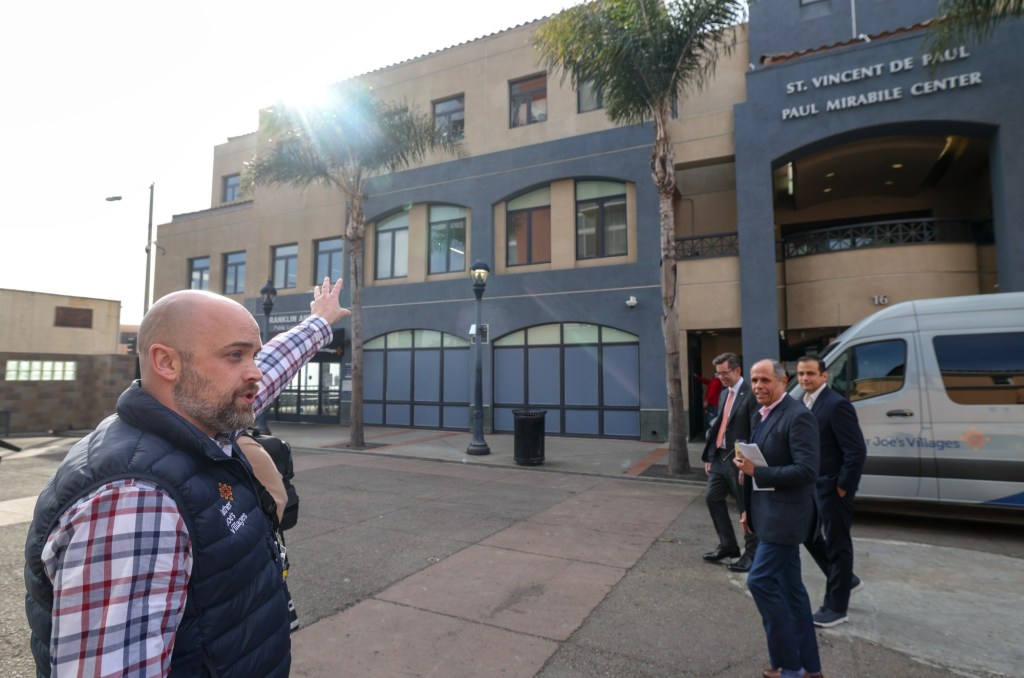
Flooring has been torn up. Wires are exposed. Scuffed concrete surrounds a glass wall that still needs to be removed.
The second level of the Paul Mirabile Center in downtown San Diego is in the final months of a renovation that will turn the longtime homeless shelter into a detox and sober-living space. “We’re trying to fill in any cracks,” said Mary Jo Scarpitti, clinic director at Father Joe’s Villages. “It just takes a little crack for somebody to fall through.”
Her statement works literally and figuratively as homelessness organizations around the region increasingly invest in addiction treatment.
A city committee in Escondido recently gave initial approval for Interfaith Community Services to increase its detox bed total from 10 to 32. The County of San Diego moved more than a year ago to find housing for an estimated 100 homeless people who were already in treatment and the state Legislature is again considering whether taxpayer dollars may be used to fund beds that require residents to abstain from alcohol and drugs.
The latter would be a significant shift for California. The current rules generally say facilities funded by cities or the state must be “low barrier,” meaning people can get a spot even if they struggle with addiction, although drinking and drug use may be banned on site.
“This is a no brainer,” said Assemblymember Matt Haney, a Democrat from San Francisco. Having people who want to get clean sleep near those who don’t “is like forcing somebody who’s trying to get off alcohol to live in a bar.”
Last year, Haney introduced a bill that would have loosened California’s Housing First policy to allow some funding to go toward programs requiring sobriety. The proposal received overwhelming bipartisan support in the Legislature’s lower house — 72 Assembly members voted “yes” while none were opposed — but it stalled in the state Senate.
After more negotiations to clarify how sober-living programs would be vetted, Haney recently reintroduced the measure as AB-255. The bill puts a cap on how many of those beds could receive public funds and he’s optimistic that the tweaked language (combined with a slightly larger Republican caucus in the Senate) will get the plan over the finish line.
Devoting more resources to substance abuse seems to be one area of agreement between many Democrats and Republicans, as well as a possible source of compromise between blue California and President Donald Trump, who has long wanted to overhaul housing first policies at the federal level.
A large body of research has shown that prioritizing housing before other problems are addressed is effective at ending homelessness. One massive Canadian study found Housing First initiatives to be more successful than efforts requiring treatment up front — yet just because the approach works for a large majority doesn’t mean it’s perfect for everybody.

Staffers at Father Joe’s said they surveyed residents of the Paul Mirabile Center back when it was a low-barrier shelter to ask what changes they’d like to see. More than 70% asked for a space where everybody inside had sworn off drugs and alcohol.
One part of the resulting overhaul is already done. The nonprofit’s Reaching Independence and Self-Empowerment program, or RISE, began at the start of the year on the center’s third floor. Renovating the building required $1.5 million while annual operating costs will be around $3.6 million, a spokesperson said.
Private donors footed the bill.
During a tour last month, Robert Boudreau, 55, told reporters that addiction had been a major reason why he ended up living outside, and he praised both the safety and structure offered by RISE. “I’m not happy on the streets,” he said. “Health wise, I knew I couldn’t do it for much longer.”

Residents may bring pets and stay for up to a year. You don’t need a substance abuse disorder to get one of the 250 or so beds but participants must agree to drug tests and meetings with case workers. The men’s side is already full and around 90 people were on the wait list as of mid-week, according to a spokesperson. The nonprofit continues to fill up the women’s area.
Dozens of beds, however, are being kept available for those who eventually sign up for the 14-day detox program on the floor below, which will hopefully launch in April. Father Joe’s is still hiring staff, securing licensure from the state and constructing nearly a dozen rooms that together will be able to hold more than 40 people.
Leaders have no illusions that two weeks is long enough to fully cure somebody. But proponents hope that time will get vulnerable patients on more stable ground.

Scarpitti, the clinic director, knows the process well. Years ago, Scarpitti traded her hometown in New Jersey for a San Diego treatment program in hopes of kicking an opioid addiction. The first weeks were marked by pain, shame and an inability to sleep, she said. Scarpitti feels that program may have put too much responsibility on her too fast and hopes Father Joe’s will instead give participants more of a breather, albeit one with strict rules.
In North County, the Escondido Planning Commission voted last month to expand Interfaith’s detox program at the group’s downtown headquarters. The proposal is expected to be considered Feb. 19 by the full City Council.
Originally Published:





